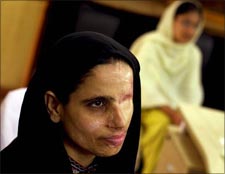 Here's a closer look at the Pakistani Oscar-winning film Saving Face, and it's director Sharmeen Obaid-Chinoy.
Here's a closer look at the Pakistani Oscar-winning film Saving Face, and it's director Sharmeen Obaid-Chinoy.
A story of survival and hope, the Oscar winning documentary for short subject, Saving Face, not only tells the story of two women who are victims of acid attacks in Pakistan but also that of plastic surgeon Mohammad Jawad who returned to Pakistan from London to help victims.
The first ever film from Pakistan to win an Oscar, Saving Face was directed by Emmy winner and journalist Sharmeen Obaid-Chinoy with Daniel Junge. Obaid-Chinoy, 33, is married to a Pakistani in Canada and divides time between Toronto and her hometown Karachi.
In Pakistan, a woman's face is deemed to be her greatest asset, the filmmakers say. 'Someone seeking to punish a woman need only destroy her face to do her permanent harm -- both physically and socially.'
Saving Face exposes how acid attacks affect women in Pakistan, including Zakia, whose husband attacked her outside a courthouse when she filed for divorce, and Rukhsana, whose spouse threw acid on her in their home where she still lives because she cannot afford to care for her children alone.
Zakia not only benefited from Dr Jawad's treatment, she also went to court to prosecute her husband for the attack. The case became the first to be tried under a new law in Pakistan that punishes perpetrators of acid attacks with life imprisonment.
Each year, hundreds of women in Pakistan, India and Bangladesh become acid attack victims. According to the film, the majority of the attacks are carried out by enraged husbands or rejected suitors. Reports say that in 2010, there were over 8,000 incidents of violence against women, including forced marriages and acid attacks. That number is low, as some victims do not report the crimes, social workers say.
The film, which charts the work of Balsall Heath, United Kingdom-based non-governmental organization Islamic Help and its long-running program in treating victims of devastating attacks, received accolades in the short
Obaid-Chinoy said: 'Daniel Junge thought it would be fascinating to see how Dr Jawad's revolutionary plastic surgery skills could be used. Our story shows the audience how a country's own people can help overcome problems. We hope the documentary will help people understand acid violence.'
Saving Face competed against God Is the Bigger Elvis, a Rebecca Cammisa and Julie Anderson film about a mid-century starlet who chose the church over Hollywood; Barber of Birmingham, a Gail Dolgin and Robin Fryday film that follows the life of 85-year-old barber James Armstrong and the legacy of the civil rights movement; James Spione's war film Incident in New Baghdad; and The Tsunami and the Cherry Blossom by Lucy Walker and Kira Carstensen that follows the survivors of Japan's 2011 earthquake and their struggle to recover from the devastation.
Obaid-Chinoy, who received an international Emmy award for her documentary film Pakistan's Taliban Generation, has also received several awards from South Asian Journalists Association (SAJA).
She has two masters' degrees from Stanford and has made over a dozen-multi award winning films in over 10 countries around the world and is the first non-American to be awarded the Livingston Award for best international reporting.
Most of her work carried out in the last eight years has centered on the problems of Muslim and non-Muslim women including the problems faced by women immigrants of color in a post-apartheid South Africa.
She told a Pakistan television channel that one of the many people in her family who backed her vision and her efforts was her father. Her 2008 Emmy Award winning film about the recruitment of child suicide bombers was bittersweet, she said, adding, on the same day that she landed in New York to accept the reward, father suddenly died in Karachi.
'The most incredible part of that was that the day before he passed away, I spoke to him and he said, I saw you, you won the Emmy,' she said. 'And I said, no, it's tomorrow. I haven't gone yet and he said, no, I know you won it.'
Obaid Chinoy is also one of the leaders in the 21 Young Leaders Initiative at Asia Society.
Vishakha Desai, president, Asia Society, said, ''The Asia Society extends its congratulations to Sharmeen and her co-director, Daniel Junge, for winning the award, but more importantly, for furthering the conversation to address this important issue.'









